I’m not going to lie; I was a little apprehensive coming into the new “Adult Swim” series, “Black Jesus”. That apprehension didn’t stem from the fact there was a show depicting Jesus that could eventually mock my faith. My nervousness wasn’t caused by the potential of Aaron McGruder getting out of his animated comfort zone and failing. In reality, my trepidation was due to the fact I had watched the original skit put out by Adult Swim featuring McGruder’s version of “Black Jesus” (who isn’t the same “Black Jesus” introduced to the world during an episode of “Good Times”).
You see, the problem with the original version of Black Jesus was … well, Jesus was a jerk. The first Black Jesus was condescending, stingy with his wine and couldn’t help but remind his followers about the prayers he had answered. And Jesus does this all while being a bona fide couch bum who cusses like a sailor and plans to find some random broad to “smash.”
In truth, McGruder’s first attempt at showcasing his “Black Jesus” came across as a bad Youtube video with his name attached to it. But the 2014 series promised to be a lot better both in quality and Black Jesus’ attitude featuring all-star actors like John Witherspoon, Angela Gibbs, and the late Rick James’ favorite Murphy, Charlie Murphy. So I sat down like many other intrigued viewers and watched a smiling man (Gerald “Slink” Johnson of “Grand Theft Auto V” fame) dressed in a brown and white robe with matching sandals, a crown of thorns adorning his head and a toothy smile that would brighten anyone’s day appear on my screen.
In the season’s opening minutes, viewers are given a glimpse into how Black Jesus operates when he’s confronted by local bum and equal opportunity alcoholic, Lloyd (played by John Witherspoon). Following a tight, dusty embrace between the two, Lloyd requests the upcoming lottery numbers so he could finally make some money. Black Jesus quickly reminds Lloyd of the problems facing people around the world and what really matters in a person’s life, “…some kindness, compassion, and love for all mankind.”
Seeing no benefit in possessions not seen by the human eye, Lloyd insults his Lord and savior while Jesus, though angry, quickly reminds his offender that he still loves him. Before moving on, lets go back to the premise of “Black Jesus” and why a situation like the one mentioned sentences earlier actually works. The series is a partial reimagining of Jesus’ life on Earth where he walked among men, preaching the gospel and trying to spread his father’s love to all those who would listen while also being promoted as Jesus’ second coming. Instead of living in the Middle East where his fashion sense wouldn’t be questioned, Black Jesus hangs out in a van or his tent in the middle of current day Compton, California. And just like Jesus in his day, Black Jesus isn’t accepted by everyone to be the Son of God.
This disbelief in Jesus’ identity causes Jesus and his crew of disciples to run a foul with apartment landlord and overly righteous Vic (Murphy) and Jesus’ intended actions to help his community when his marijuana-hogging self just couldn’t get enough of that good stuff. But Jesus and Vic going back and forth all the time would get boring fast if not for the cast of supporting characters making up Jesus’ followers (and Jesus’ ability to easily forgive and forget). There was hot-headed ex-con Fish (whose interactions with Vic usually provided the biggest laughs of any episode when they were in the same vicinity); underachieving, somewhat “doubting Thomas” Boonie (played by comedian Corey Holcomb); the pretty girl with low self-esteem and a social media obsession Maggie (Kali Hawk of “New Girl” and “Couples Retreat” fame); “kid hanging around the wrong crowd” character in Jason; the technology-inclined, faithful Trayvon.
Yeah that reads like a bunch of stereotypical archetypes, but they help things work effectively and, most importantly, from an entertainment level. To put it simply, everything clicks; be it between the actors, the unexpected and/or cliché conflicts, or even the moral high ground Jesus happily takes any time someone accosts him either physically or verbally (or both). As the season progresses and ideals and beliefs change for certain characters who feel Jesus’ repeated preaching of kindness, generosity and forgiveness finally rubbing off on them, so does the series grow beyond the “stoner comedy with heart” tagline many early reviewers gave the show.
But Black Jesus (both the character and the series) wasn’t perfect. First off there was Jesus himself. One of the biggest complaints people had who only watched the trailer was the portrayal of Jesus when it came to his humanity. Black Jesus would drop an F-bomb or two, smoke a bunch of weed and celebrate the simplicity of doing nothing. While that might not sound too offensive, for black people to see Jesus succumb to the negative stereotypes of African-American culture (having no self control, getting high and encouraging laziness) can be a little off-putting; even if the argument was made that Jesus is a product of his environment. Though Black Jesus did have faults like any relatable man, he grows beyond the stereotypes and showcases the basis of his faith by trying to help his fellow man (something that people wouldn’t understand without watching the show).
The season’s main storyline also became tunneling to the series as it progressed. Jesus and his followers had the idea (well, mostly Jesus) to create a community garden that would provide both free vegetables for the people of Compton (and weed for Jesus-plus four). With each passing episode came a more serious tone and moments almost too cliché for its own good (and an ending that definitely felt rushed and forced).
But probably the biggest flaw in “Black Jesus” was an area not fully explored – did “Pops” really have a plan? For much of the season, Jesus went out of his way to remind everyone that if they did “A”, “B” would occur. But there were many times when “B” turned into “C”, and even “F”. And when it seemed like the realm of possibility would be explored, “blind faith” came to the rescue. With “Black Jesus” being more light-hearted than dark comedy (no pun intended), it’s understandable why the writers wouldn’t fully question God’s potential motives and stick to the old, “God works in mysterious ways,” failsafe.
“Black Jesus” didn’t and probably won’t save any souls, convert anyone into believers or even make them create their own community garden. The series isn’t condemning to Christianity or the beliefs of Jesus himself (loving everyone from believers to atheists alike). But the season did provide a set of virtues that everyone should aspire to have. Hopefully the message of unconditional love, and faith in the goodness of mankind that was consistently repeated during the season can spread through all people no matter faith, religion or belief system while creating smiles, memories (both good and frustrating) and some green tomatoes full of God’s love and grace.


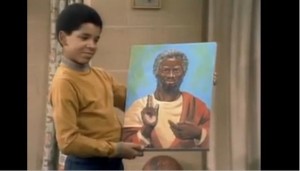
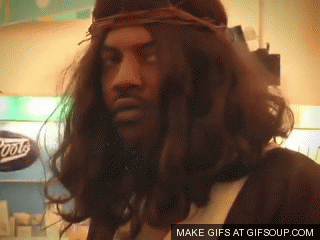
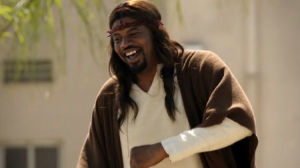
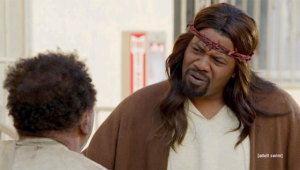
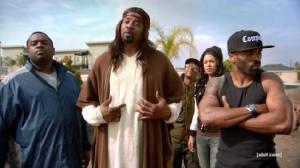
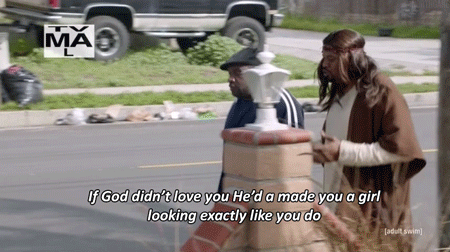
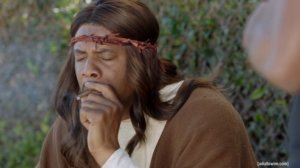
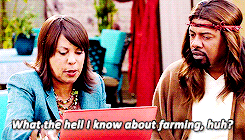
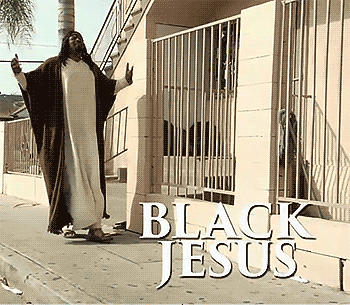



3 pings